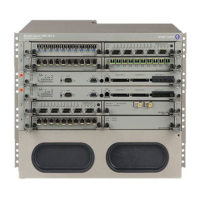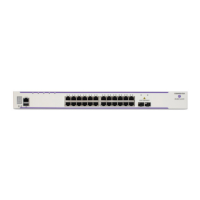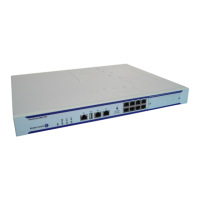Virtual Private Routed Network Services
7750 SR OS Services Guide Page 995
Subscriber Interface Commands
subscriber-interface
Syntax subscriber-interface ip-int-name [fwd-service service-id fwd-subscriber-interface ip-int-
name]
no subscriber-interface ip-int-name
Context config>service>vprn
Description This command allows the operator to create special subscriber-based interfaces. It is used to contain
multiple group interfaces. Multiple subnets associated with the subscriber interface can be applied to
any of the contained group interfaces in any combination. The subscriber interface allows subnet
sharing between group interfaces.
Use the no form of the command to remove the subscriber interface.
Parameters ip-int-name — Specifies the name of the IP interface. Interface names can be from 1 to 32
alphanumeric characters. If the string contains special characters (#, $, spaces, etc.), the entire
string must be enclosed within double quotes.
fwd-service service-id — Specifies the forwarding service ID for a subscriber interface in a retailer
context.
fwd-subscriber-interface ip-int-name — Specifies the forwarding subscriber interface for a
subscriber interface in a retailer context.
address
Syntax [no] address {ip-address/mask | ip-address netmask} [gw-ip-address ip-address]
Context config>service>vprn>subscriber-interface
Description This command configures the local subscriber subnets available on a subscriber IP interface. The
configured ip-address and mask define the address space associated with the subscriber subnet. Up to
16 IP subnets can be created on a single subscriber IP interface. Each subnet supports a locally owned
IP host address within the subnet that is not expected to appear on other routers that may be servicing
the same subscriber subnet. For redundancy purposes, the keyword gw-address defines a separate IP
address within the subnet for Subscriber Routed Redundancy Protocol (SRRP) routing. This IP
address must be the same on the local and remote routers participating in a common SRRP instance.
In SRRP, a single SRRP instance is tied to a group IP interface. The group IP interface is contained
directly within a subscriber IP interface context and thus directly associated with the subscriber
subnets on the subscriber IP interface. The SRRP instance is also indirectly associated with any
subscriber subnets tied to the subscriber interface through wholesale/retail VPRN configurations.
With the directly-associated and the indirectly-associated subscriber interface subnets, a single SRRP
instance can manage hundreds of SRRP gateway IP addresses. This automatic subnet association to
the SRRP instance is different from VRRP where the redundant IP address is defined within the
VRRP context.
Defining an SRRP gateway IP address on a subscriber subnet is not optional when the subnet is
associated with a group IP interface with SRRP enabled. Enabling SRRP (no shutdown) will fail if
